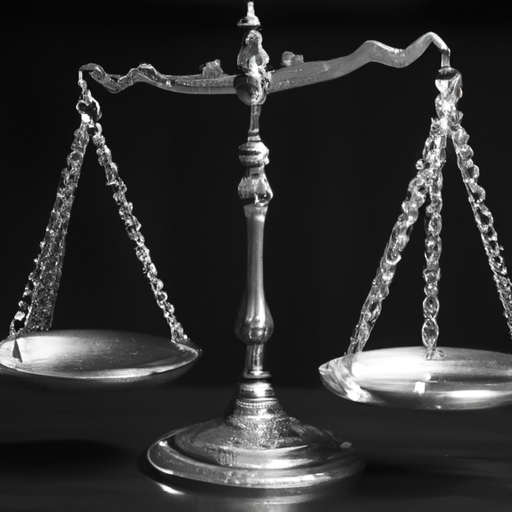In the complex world of criminal law, understanding the criminal code is crucial. The criminal code forms the foundation of our legal system, outlining the laws and penalties for various criminal offenses. From theft and assault to drug possession and white-collar crimes, the criminal code encompasses a wide range of offenses and their corresponding consequences. Navigating this intricate framework can be overwhelming, particularly for business owners who may find themselves facing criminal charges. However, with the guidance of a skilled criminal defense attorney, you can gain a comprehensive understanding of the criminal code and equip yourself with the knowledge needed to protect your rights and navigate the legal process effectively. In this article, we will explore the importance of the criminal code, address common questions and concerns, and provide guidance on how to secure the legal representation you need.
Overview of Criminal Code

Definition of Criminal Code
The Criminal Code is a body of laws that defines and outlines the criminal offenses and procedures in a jurisdiction. It establishes the legal framework for apprehending, charging, trying, and punishing individuals who commit crimes. The Criminal Code serves as a comprehensive guide for prosecutors, defense attorneys, judges, and law enforcement agencies, ensuring that justice is upheld in society.
Purpose of Criminal Code
The main purpose of the Criminal Code is to maintain social order and protect the rights and safety of individuals within a society. It aims to deter criminal behavior, punish offenders, and provide a fair and just legal process. By clearly defining crimes and their associated penalties, the Criminal Code ensures consistency in the application of the law and promotes public confidence in the justice system.
Structure of the Criminal Code
The structure of the Criminal Code typically consists of various parts, chapters, and sections that organize different types of offenses and the corresponding legal provisions for each. It includes definitions of crimes, elements of criminal liability, defenses, procedures, and penalties. This organized structure allows legal professionals to navigate and interpret the law effectively, ensuring justice and fairness in the criminal justice system.
Categories of Crimes
Felonies
Felonies are serious criminal offenses that typically carry severe penalties, including imprisonment for more than one year, fines, or both. Examples of felonies include murder, rape, robbery, and drug trafficking. Convictions for felonies can result in long-term consequences, such as the loss of certain civil rights and difficulty finding employment. Prosecutors must prove beyond a reasonable doubt that the defendant committed the crime to secure a felony conviction.
Misdemeanors
Misdemeanors are less serious offenses compared to felonies but still carry potential penalties, such as imprisonment for up to one year, fines, or both. Common examples of misdemeanors include petty theft, disorderly conduct, simple assault, and certain drug possession charges. The standard of proof required for a misdemeanor conviction is typically lower than that of a felony, but the defendant still enjoys certain constitutional protections.
Infractions
Infractions, also known as violations or petty offenses, are minor offenses that do not usually result in imprisonment. Examples of infractions include traffic violations, public nuisance, and public intoxication. These offenses are often punishable by fines or other non-custodial penalties. Infractions may not carry the same weight as felonies or misdemeanors, but individuals charged with infractions still have legal rights and may contest their charges in court.
Elements of a Crime
Actus Reus
Actus Reus refers to the physical act or conduct that constitutes a crime. It is the external component of a crime that involves a voluntary act or failure to act when there is a legal duty to do so. The Actus Reus must be proven by the prosecution beyond a reasonable doubt to establish the commission of a crime. Examples of Actus Reus include theft, assault, and driving under the influence.
Mens Rea
Mens Rea, often referred to as the “guilty mind,” refers to the mental state or intent of the defendant in committing a crime. It involves the awareness or knowledge of the wrongdoing, coupled with a voluntary decision to engage in the prohibited conduct. Different crimes require varying levels of Mens Rea, such as intent, recklessness, or negligence. The Mens Rea must be proven by the prosecution to establish the defendant’s criminal culpability.
Causation
Causation refers to the link between the defendant’s conduct and the resulting harm or consequences. The prosecution must establish a causal connection between the defendant’s actions and the harm suffered by the victim. The concept of causation ensures that individuals are held accountable for the foreseeable consequences of their actions. It is an essential element of many criminal offenses, such as homicide and assault.
Defenses in Criminal Law
Self-Defense
Self-defense is a legal defense that allows individuals to protect themselves or others from imminent threats of harm. It is based on the belief that individuals have a right to defend themselves when faced with an immediate danger. To successfully claim self-defense, the defendant must demonstrate that their actions were reasonable under the circumstances and proportional to the threat they faced.

Lack of Intent
Lack of intent is a common defense in criminal cases, especially for offenses that require a specific mental state, such as intent or knowledge. If the defendant can prove that they did not have the required intent to commit the alleged crime, it may result in a reduced charge or a complete acquittal. However, the absence of intent must be supported by credible evidence and presented effectively during the trial.
Insanity Defense
The insanity defense is a legal strategy used in cases where the defendant’s mental state at the time of the offense may have impaired their understanding of the wrongfulness of their actions. This defense acknowledges that individuals suffering from severe mental illnesses may not meet the requirements for criminal liability. The burden of proof lies with the defendant, who must demonstrate, usually through expert testimony, that they were legally insane at the time of the crime.
Procedures and Penalties
Arrest and Investigation
The arrest and investigation stage is crucial in the criminal justice process. It involves law enforcement agencies gathering evidence, interviewing witnesses, and apprehending suspects believed to have committed a crime. The arrest must be based on probable cause, which means that there must be a reasonable belief that a crime has been committed and that the person being arrested is responsible. During this stage, individuals have certain rights, such as the right to remain silent and the right to an attorney.
Criminal Charges
Once the investigation is complete, the prosecuting authority decides whether to file criminal charges against the suspect. This decision is based on the evidence and the applicable laws. If charges are filed, the accused person will be formally notified of the charges and the specifics of the alleged offense. It is at this stage that the defendant becomes a party to the criminal proceedings and can begin to build a defense strategy.
Bail and Pre-Trial Release
Bail and pre-trial release allow individuals charged with a crime to be released from custody pending their trial. Bail is typically granted in exchange for a financial payment or a bond, which serves as a guarantee that the defendant will appear in court for trial. Pre-trial release may also be granted without bail, depending on factors such as the nature of the offense, the defendant’s criminal history, and the risk of flight or danger to the community. Bail and pre-trial release provide defendants with an opportunity to prepare their defense outside of jail.
Criminal Trial Process
The criminal trial process involves presenting evidence, examining witnesses, and making legal arguments before a judge or a jury. Both the prosecution and the defense have the opportunity to present their case and challenge the evidence and testimony presented by the other side. The trial process ensures that the accused is afforded their constitutional right to due process and a fair trial. At the end of the trial, the judge or jury will render a verdict of guilty or not guilty.
Sentencing and Penalties
Upon a guilty verdict or a plea of guilty, the court determines the appropriate sentence or penalty for the convicted individual. Sentencing considerations may include the seriousness of the offense, the defendant’s criminal history, the presence of aggravating or mitigating factors, and the need for deterrence or rehabilitation. Penalties can range from fines and probation to imprisonment or even capital punishment, depending on the jurisdiction and the nature of the crime.
Constitutional Rights in Criminal Cases
Right to Counsel
The right to counsel, also known as the right to an attorney, is a fundamental constitutional right afforded to individuals facing criminal charges. This right ensures that defendants have legal representation to navigate the complexities of the criminal justice system, understand their rights, and mount an effective defense. It guarantees access to competent and effective legal counsel at all critical stages of the criminal proceedings.
Right to Remain Silent
The right to remain silent, often referred to as the right against self-incrimination, protects individuals from being compelled to provide testimonial evidence against themselves. It recognizes that forcing individuals to testify or confess against their will violates their constitutional rights. This right allows defendants to refuse to answer questions or provide statements that may be used against them in court.
Right to a Fair Trial
The right to a fair trial is a cornerstone of the criminal justice system. It ensures that defendants are afforded their constitutional rights and guarantees a fair and impartial process. The right includes the right to competent legal representation, the right to confront and cross-examine witnesses, the right to present a defense, and the right to be judged by an impartial jury. A fair trial is essential for upholding the principles of justice and protecting individual rights.
Reform and Amendments to Criminal Code

Historical Perspectives
The Criminal Code has evolved over time through various reforms and amendments. Historical perspectives provide insight into the development of criminal laws and the societal changes that have influenced their reform. Reforms have been aimed at addressing flaws or inefficiencies in the criminal justice system, ensuring fair treatment for defendants, and aligning the law with evolving societal values.
Recent Amendments
Recent amendments to the Criminal Code reflect changes in societal attitudes, advancements in technology, and emerging trends in criminal activity. These amendments are often responses to new challenges faced by law enforcement, prosecutors, and the courts. Recent amendments may include provisions related to cybercrime, terrorist activities, or enhancements to victim rights and protections.
Proposed Reforms
Proposed reforms to the Criminal Code often arise from public discussions, academic research, and input from legal professionals. These reforms aim to address perceived injustices, improve access to justice, reduce recidivism rates, and promote the fair and efficient administration of criminal justice. Proposed reforms may focus on sentencing guidelines, rehabilitation programs, alternative dispute resolution methods, or the decriminalization of certain offenses.
Criminal Code vs. Civil Law
Differences in Legal Concepts
The Criminal Code and civil law are two distinct branches of law that serve different purposes and have varying legal concepts. The Criminal Code deals with crimes and criminal offenses, while civil law primarily focuses on resolving disputes between private parties. Criminal law is concerned with societal order and the prosecution of offenders, while civil law aims to compensate the injured party and ensure civil justice.
Burden of Proof
In criminal law, the burden of proof rests on the prosecution, who must prove the defendant’s guilt beyond a reasonable doubt. This high standard of proof is necessary to protect individuals from wrongful conviction and potential loss of liberty. In civil law, the burden of proof is usually lower, referred to as the preponderance of the evidence. This standard requires the plaintiff to prove that their claim is more likely true than not.
Remedies
The remedies available in criminal and civil cases differ significantly. In criminal law, the primary remedy is punishment for the offender, such as imprisonment or fines. Criminal law focuses on maintaining social order, deterring criminal behavior, and rehabilitating offenders. In civil law, the primary remedy is often monetary compensation for the injured party, known as damages. Civil law seeks to restore the injured party to the position they were in before the harm occurred and to rectify any losses suffered.
Case Studies and Real-Life Scenarios
Case 1: Burglary and Self-Defense
In this case, a business owner discovers an intruder attempting to break into their store after hours. Fearing for their safety, the business owner defends themselves by using reasonable force to repel the intruder. The business owner is subsequently charged with assault. This case highlights the defense of self-defense, where the business owner can argue that their actions were justified in the face of immediate harm.
Case 2: Drug Possession and Fourth Amendment Rights
In this case, a driver is pulled over by the police for a minor traffic violation. During a search of the vehicle, the police discover illegal drugs. The driver claims that the search was conducted without a proper warrant, in violation of their Fourth Amendment rights. This case raises constitutional issues regarding search and seizure, specifically the requirement of probable cause and a valid warrant.
Case 3: White-Collar Crime and Corporate Liability
In this case, a high-level executive of a corporation is accused of embezzling funds and committing fraud. The executive argues that their actions were carried out in the regular course of business and that they did not act with criminal intent. This case examines the elements of white-collar crime and the concept of corporate liability, where individuals can be held accountable for their actions within a corporate setting.
Frequently Asked Questions
FAQ 1: What is the difference between a felony and a misdemeanor?
A felony is a more serious criminal offense that typically carries severe penalties, such as imprisonment for more than one year, while a misdemeanor is a less serious offense that carries less severe penalties, such as imprisonment for up to one year. The distinction between the two is based on the severity of the crime and its potential societal implications.
FAQ 2: Can a person be convicted of a crime without intent?
In certain cases, individuals can be convicted of crimes even without intent. Some offenses, known as strict liability crimes, do not require proof of intent for a conviction. However, many crimes do require a mental state or intent to establish criminal liability, and lack of intent can be a defense in those cases.
FAQ 3: What are the potential penalties for a criminal conviction?
The potential penalties for a criminal conviction can vary depending on the nature of the offense, the jurisdiction, and the defendant’s criminal history. Penalties may include imprisonment, fines, probation, community service, restitution, or a combination of these. The severity of the offense and other factors will influence the specific penalties imposed.
FAQ 4: Can I represent myself in a criminal trial?
Yes, individuals have the right to represent themselves in a criminal trial, but it is generally not recommended. Criminal proceedings involve complex legal procedures, rules of evidence, and strategic considerations that are best handled by experienced legal professionals. Representing oneself can lead to procedural errors, inadequate defense strategies, and ultimately, unfavorable outcomes.
FAQ 5: How long does a criminal record last?
The duration of a criminal record depends on various factors, such as the nature of the offense, the jurisdiction, and the individual’s criminal history. In some cases, criminal records may be expunged or sealed, effectively removing them from public view. However, certain convictions may result in a permanent criminal record that can have long-lasting consequences, including difficulties in employment, housing, and other areas of life.



